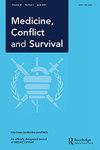Conflict, climate change and the need for safe spaces: the interlocking problems that urgently need joined up solutions.
Q3 Medicine
引用次数: 0
Abstract
At the time of writing, and with Bakhmut and Khartoum on fire, it was made public by the Stockholm International Peace Research Institute (SIPRI) that Europe saw its steepest year-on-year increase in military expenditure for at least 30 years and that global military expenditure had reached a new high (SIPRI 2023). There are of course numerous possible explanations for this with the ongoing war in Ukraine being the first and foremost. On a brighter note, Saudi Arabia and Iran have agreed to resume ties after seven years of tension, agreeing to reopen their respective embassies within the next two months (Nereim 2023). This is a much-needed glimmer of hope that will hopefully further the cause of peace in Yemen where Saudi Arabia and Iran support opposing sides. But the fact that rising military expenditures are explainable does not of course make them acceptable. An end to the Ukraine war seems a distant possibility. In spite of all the military expenditure, a military ‘solution’ appears out of sight and proposals for negotiations are not taken seriously. Formerly neutral countries Finland and Sweden have joined NATO or want to join, respectively. The minimal 2% national defence budget NATO demands of its members is rarely discussed anymore, whereas before few countries reached it (House of Commons Library 2022). All these recently manufactured weapons pollute and destroy the earth and its inhabitants literally and psychologically. And when the war is over, the new weapon technology will still be there, and many of the old weapons will remain. Trying to reach an end to the war in Ukraine with military means, which could happen, would set a dangerous precedent in relation to future resolutions. If proposals to resolve the situation peacefully are not taken seriously, militarism will only result in even more militarism, resulting in a growing number of refugees and IDPs and an increased lack of safe spaces: real safe spaces – territorial, physical and psychosocial. The rise in military expenditure, which is happening at the same time as global calls to combat climate change become ever more urgent, is an example of the interlocking problems addressed in this issue, which starts with a letter from the IPPNW-Europe meeting in Hamburg in January this year. Remarkable is that one of the most worrying issues discussed at MEDICINE, CONFLICT AND SURVIVAL 2023, VOL. 39, NO. 2, 111–113 https://doi.org/10.1080/13623699.2023.2216486冲突、气候变化和对安全空间的需求:迫切需要联合解决的连锁问题。
本文章由计算机程序翻译,如有差异,请以英文原文为准。
求助全文
约1分钟内获得全文
求助全文
来源期刊

Medicine, Conflict and Survival
Medicine-Pathology and Forensic Medicine
CiteScore
1.80
自引率
0.00%
发文量
46
期刊介绍:
Medicine, Conflict and Survival is an international journal for all those interested in health aspects of violence and human rights. It covers: •The causes and consequences of war and group violence. •The health and environmental effects of war and preparations for war, especially from nuclear, radiological, chemical and biological weapons of mass destruction. •The influence of war and preparations for war on health and welfare services and the distribution of global resources . •The abuse of human rights, its occurrence, causes and consequences. •The ethical responsibility of health professionals in relation to war, social violence and human rights abuses. •Non-violent methods of conflict resolution.
 求助内容:
求助内容: 应助结果提醒方式:
应助结果提醒方式:


